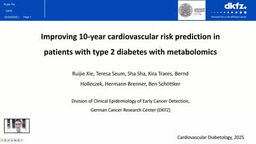Call for papers "Artificial intelligence in cardiovascular endocrinology: advancing precision in cardiometabolic care"
Published in Computational Sciences and General & Internal Medicine

In recent years, artificial intelligence (AI) has begun to permeate the clinical landscape—not as a distant promise, but as a transformative force in real-time decision-making. Nowhere is this transformation more compelling than at the crossroads of cardiovascular endocrinology, where hormonal disorders and metabolic dysregulation drive some of the world’s most pressing cardiovascular challenges.
Endocrine disorders such as diabetes, thyroid dysfunction, and adrenal abnormalities are major contributors to cardiovascular morbidity and mortality. Yet the tools traditionally used to assess cardiovascular risk often fail to capture the nuanced and dynamic nature of these diseases. AI is poised to fill this gap.
Emerging machine learning models can now detect early cardiovascular complications in patients with metabolic disorders, identify risk trajectories that are invisible to conventional clinical tools, and integrate vast amounts of data—from electronic health records and laboratory results to imaging and genomics—into clinically meaningful insights. Moreover, AI-powered wearable technologies are facilitating continuous, real-time monitoring, offering clinicians unprecedented opportunities for early intervention and personalized care outside traditional healthcare settings.
Despite these advances, key challenges remain. Algorithmic bias, lack of transparency in AI decision-making, and disparities in access to digital technologies are serious concerns that demand thoughtful and interdisciplinary solutions. Clinicians and researchers must be actively involved in shaping how AI is developed, validated, and implemented to ensure its safe and equitable use across diverse patient populations.
We welcome submissions addressing, but not limited to:
- AI-based prediction and prevention of cardiovascular events in endocrine disorders
- Integration of AI with imaging, laboratory, and wearable data in clinical practice
- Development of clinical decision support systems for cardiometabolic management
- Applications of AI in diabetic cardiomyopathy and other endocrine-related heart diseases
- Ethical, legal, and health equity considerations in the deployment of AI technologies
This is a pivotal moment for the evolution of precision medicine in cardiometabolic care. By harnessing the power of AI, we have the opportunity to redefine standards of care, close diagnostic gaps, and improve outcomes for high-risk patient populations.
We encourage you to submit your work and join us in advancing this important and timely field. Together, let us shape a future where intelligent systems complement clinical expertise for the benefit of all.
Please find further information on the collection page.
Follow the Topic
-
Cardiovascular Diabetology – Endocrinology Reports

This is an official companion journal to Cardiovascular Diabetology and is an open access journal publishing on clinical, translational and basic science aspects of endocrinology.
Related Collections
With Collections, you can get published faster and increase your visibility.
Cardiorelated aspects in thyroid disorders
We are pleased to announce a call for papers for a Collection focusing on “Cardiorelated aspects in thyroid disorders”. The intricate relationship between thyroid function and cardiovascular health remains a critical area of investigation, with profound implications for clinical practice and patient outcomes.
Thyroid dysfunction, including hypothyroidism, hyperthyroidism, and subclinical thyroid disorders, significantly influences cardiovascular physiology, contributing to arrhythmias, hypertension, atherosclerosis, and heart failure. Emerging research highlights the role of thyroid hormones in vascular biology, myocardial contractility, and metabolic regulation, emphasizing the need for a deeper understanding of these interactions.
We invite original research, review articles, and clinical case reports that explore:
- The impact of thyroid dysfunction on cardiac structure and function;
- Thyroid hormone signaling in vascular and myocardial remodeling;
- Risk stratification and management of cardiovascular complications in thyroid disorders;
- Novel therapeutic targets bridging endocrinology and cardiology;
- The role of biomarkers and imaging in assessing cardiovascular risk in thyroid disease.
This Collection supports and amplifies research related to SDG 3, Good Health and Well-Being.
All submissions in this collection undergo the journal’s standard peer review process. Similarly, all manuscripts authored by a Guest Editor(s) will be handled by the Editor-in-Chief. As an open access publication, this journal levies an article processing fee (details here). We recognize that many key stakeholders may not have access to such resources and are committed to supporting participation in this issue wherever resources are a barrier. For more information about what support may be available, please visit OA funding and support, or email OAfundingpolicy@springernature.com or the Editor-in-Chief.
Publishing Model: Open Access
Deadline: Mar 17, 2026
Artificial intelligence in cardiovascular endocrinology: advancing precision in cardiometabolic care
In recent years, artificial intelligence (AI) has begun to permeate the clinical landscape—not as a distant promise, but as a transformative force in real-time decision-making. Nowhere is this transformation more compelling than at the crossroads of cardiovascular endocrinology, where hormonal disorders and metabolic dysregulation drive some of the world’s most pressing cardiovascular challenges.
Endocrine disorders such as diabetes, thyroid dysfunction, and adrenal abnormalities are major contributors to cardiovascular morbidity and mortality. Yet the tools traditionally used to assess cardiovascular risk often fail to capture the nuanced and dynamic nature of these diseases. AI is poised to fill this gap.
Emerging machine learning models can now detect early cardiovascular complications in patients with metabolic disorders, identify risk trajectories that are invisible to conventional clinical tools, and integrate vast amounts of data—from electronic health records and laboratory results to imaging and genomics—into clinically meaningful insights. Moreover, AI-powered wearable technologies are facilitating continuous, real-time monitoring, offering clinicians unprecedented opportunities for early intervention and personalized care outside traditional healthcare settings.
Despite these advances, key challenges remain. Algorithmic bias, lack of transparency in AI decision-making, and disparities in access to digital technologies are serious concerns that demand thoughtful and interdisciplinary solutions. Clinicians and researchers must be actively involved in shaping how AI is developed, validated, and implemented to ensure its safe and equitable use across diverse patient populations.
In response to the rapid developments in this space, we invite clinicians, researchers, and healthcare innovators to contribute to this emerging field through original research, reviews, perspectives, and clinical case studies.
We welcome submissions addressing, but not limited to:
- AI-based prediction and prevention of cardiovascular events in endocrine disorders
- Integration of AI with imaging, laboratory, and wearable data in clinical practice
- Development of clinical decision support systems for cardiometabolic management
- Applications of AI in diabetic cardiomyopathy and other endocrine-related heart diseases
- Ethical, legal, and health equity considerations in the deployment of AI technologies
This is a pivotal moment for the evolution of precision medicine in cardiometabolic care. By harnessing the power of AI, we have the opportunity to redefine standards of care, close diagnostic gaps, and improve outcomes for high-risk patient populations.
We encourage you to submit your work and join us in advancing this important and timely field. Together, let us shape a future where intelligent systems complement clinical expertise for the benefit of all.
This Collection supports and amplifies research related to SDG 3, Good Health and Well-Being.
All submissions in this collection undergo the journal’s standard peer review process. Similarly, all manuscripts authored by a Guest Editor(s) will be handled by the Editor-in-Chief. As an open access publication, this journal levies an article processing fee (details here). We recognize that many key stakeholders may not have access to such resources and are committed to supporting participation in this issue wherever resources are a barrier. For more information about what support may be available, please visit OA funding and support, or email OAfundingpolicy@springernature.com or the Editor-in-Chief.
Publishing Model: Open Access
Deadline: Mar 07, 2026



Please sign in or register for FREE
If you are a registered user on Research Communities by Springer Nature, please sign in